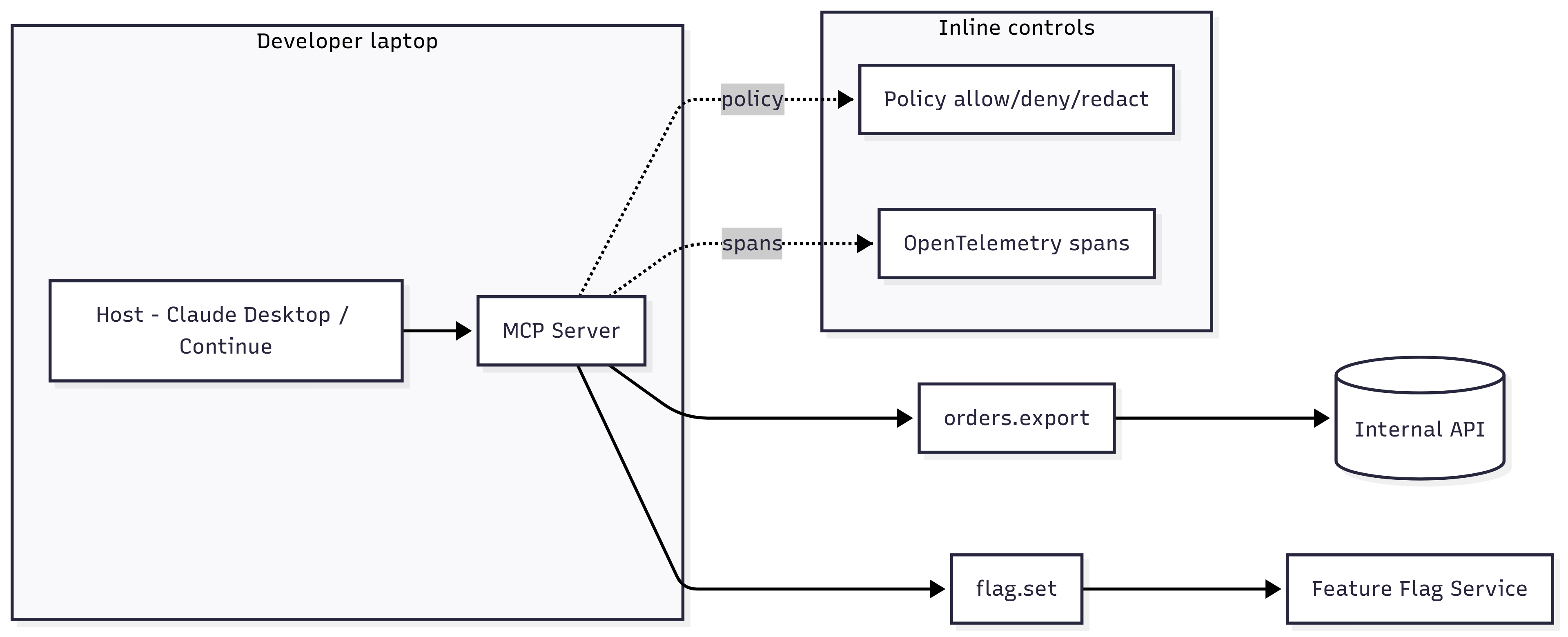TL;DR
You’ll stand up a minimal MCP server, wire two real tools (one read, one write), add inline guardrails, light tracing, and CI tests. By the end, your full-stack team can turn a chat prompt into governed actions across your APIs with predictable cost and clean debuggability.
Who this is for
Full-stack teams that own features end-to-end and want a single, safe way to let agents (and IDE copilots) call your internal tools and services.
What you’ll ship (today)
- A minimal MCP server (Node or Python) running locally over stdio
- Two tools: orders.export (read with masking) and flag.set (write with limits)
- Inline policy: allow, deny, redact + region routing
- Traces: spans stitched for agent → MCP → API with useful attributes
- CI checks: golden flow + one adversarial “don’t allow bulk write without ticket”
- Host config (Claude Desktop or VS Code + Continue) to use your server
Prerequisites
- Node 18+ or Python 3.10+
- A test API to hit (even a mock)
- VS Code (optional), Git, a place to run CI
Architecture at a glance

Play 0 - Scaffold the server (10–15 min)
Option A: TypeScript (Node)
Option B: Python
Play 1 - Wire a host (Claude Desktop or VS Code)
Claude Desktop (example)
Restart Claude Desktop, approve tools, try:
- “Export orders from 2025-08-25 to 2025-08-31 with emails masked”
- “Set flag checkout_v2 to 10 percent in staging”
- “Set flag checkout_v2 to 50 percent in prod” → expect deny without ticket
VS Code + Continue (conceptual)
Open Continue’s settings and register a “custom MCP server” with command and args pointing to your script. Test the same prompts inside the IDE.
Play 2 - Put policy in the path
Start with three rules: deny risky bulk, redact PII, route by region. Keep rules fast.
Tip: Start in “shadow mode” for new rules to measure impact before enforcing.
Play 3 - Identity and scopes for non-humans
Issue short-lived tokens, scope by tool and purpose, require JIT elevation for prod writes.
Elevation example:
Play 4 - Add traces you can actually use
Emit spans and attributes that make debugging obvious.
Useful span names
Helpful attributes
Even if you do not run a full OTEL stack yet, log these attributes next to each tool call.
Play 5 - Tests that prevent bad days
Add two test classes to CI:
- Golden flow: “Export orders with email masked” → expect count and masked emails.
- Adversarial: “Set checkout_v2 to 50 percent in prod” without ticket → expect deny and reason.
Example (pseudo-JS):
Play 6 - Rollout patterns that won’t wake you up at 2am
- Roll flags to 10 percent first, auto-rollback on error spike
- Require
ticketfor prod changes >10 percent - Use idempotency keys for any write tool to avoid double writes
- Put rate limits and concurrency caps on hot tools
Play 7 - Data privacy in motion
- Redact sensitive fields in prompts and outputs (email, PAN, tokens)
- Route EU data to EU storage; block unknown vendors
- Keep a “deny by default” for new external egress until reviewed
Play 8 - Cost and loop control
- Budgets per agent and per tool (e.g., daily LLM $50 for
agent:copilot) - Stop rules for long plans; alert on bursty retries
- Per-tool rate limits and P95 latency SLOs
Budget guard example:
Ops checklist (pin this to your repo)
Stdioserver runs locally; host config checked in (paths templated)- Tools have examples and schemas; inputs validated
- Policy rules in repo; shadow mode for new ones; tests pass
- Traces or structured logs with actor, tool, decision, pii.count
- Idempotency keys on writes; rate limits and caps applied
- Golden + adversarial tests in CI; PR template asks for both
- README: how to run server, host config, common prompts
Troubleshooting quickies
- Host does not see tools: wrong path or missing stdin/stdout transport, restart host.
- Tool runs but returns nothing: return envelope must include
content. - Policy blocks everything: switch new rules to shadow mode, print debug fields.
- Double writes: add idempotency key, check retries and timeouts.
- Telemetry spam: sample spans or log only on errors at first.
What good looks like after 2–3 sprints
- New internal tool wrapped in 1–2 days, with examples and tests
- 95 percent of actions have signed traces or structured logs
- Inline policy denies at least one risky action per month with low false positives
- No surprise LLM or API bills; budgets and caps visible in dashboards
- Other teams reuse your tools instead of building one-offs
How Levo can help
Levo gives your team production-grade rails without the yak-shave: mesh visibility stitched by identity, inline policy and redaction in the path, signed evidence you can export, exploit-aware tests for CI, and budget guards. You keep building features; Levo keeps actions safe, observable, and within limits.
Interested to see how this looks in practice: Book a demo.
Learn more: Levo MCP server use case → https://www.levo.ai/use-case/mcp-server


.jpg)
.jpg)
.jpg)
.jpg)
.jpg)
